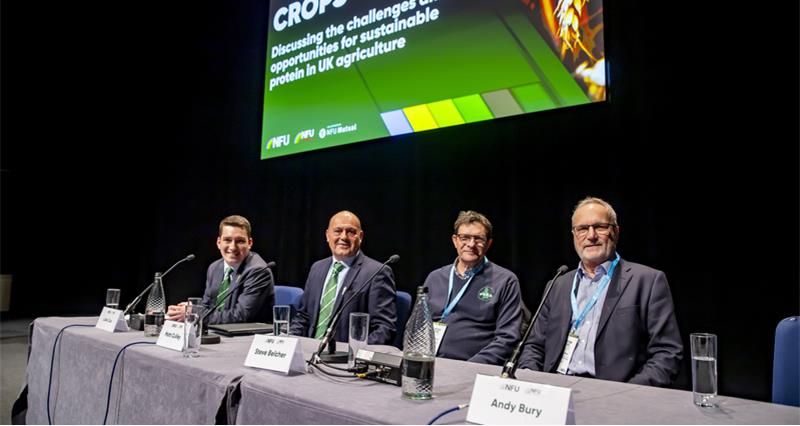After reviewing ongoing work on issues including seed treatments, parallel imports, the digital grain passport, Red Tractor, SFI and spring seed availability, board chair Matt Culley introduced speakers Steve Belcher, of the PGRO (Processors & Growers Research Organisation) and Andy Bury of Frontier Agriculture.
Steve Belcher said peas and faba beans offered a classic break crop as they don’t need applied nitrogen and leave legacy N for the following crop, making them ideal for following first wheat.
The market needs innovation and commitment from growers if it is to thrive, he added, but in return farmers would want a stable market and pricing, along with confidence in its long-term future.
‘Steered by science’
He then discussed the £5.9m four-year Nitrogen Efficient Plants for Climate Smart Arable Cropping Systems research programme, led by the PGRO.
It aims to bring about a reduction of 1.5Mt of CO2 each year or 54% of the maximum potential for UK agriculture, by increasing UK pulse and legume cropping in arable rotations to 20% (from 5%) and replacing 50% of imported soya meal used in livestock rations with homegrown feeds.
“Both of these ambitious aims will be steered by science and proven by real farm enterprises, with significant benefits for both crop and livestock productivity, including making cost savings of over £1bn per year,” he said.
“I really hope that we continue to see the pulse area grow because we have got those markets there it would be a crying shame if we see those areas reduced.”
Pulse Manager at Frontier Andy Bury
Reinforcing the message about the faba bean’s potential, Andy Bury said the UK currently produces 700,000 tonnes of the crop for a market that was hungry for pulses for feed to produce milk, meat and fish as well as beans for human consumption.
The industry needed to manage the challenges of yield and quality variability, he said, adding that market price volatility could be mitigated through growing contracts.
“I really hope that we continue to see the pulse area grow because we have got those markets there it would be a crying shame if we see those areas reduced.”
Meet the speakers from this session
Luke Cox
NFU combinable crops senior policy adviser
Matt Culley
NFU Combinable Crops Board member, regional chair (South)
Wheat is grown for the feed market, with a small area grown for seed. Winter barley is feed and spring barley is for malting. The farming partnership also runs a grain storage business with drying facilities and a soft fruit enterprise.
Matt served as NFU Combinable Crops Board chair from 2020-2024.
Andy Bury
Pulse Manager, Frontier Agriculture
Part of Andy’s role is to help ensure UK beans remain the cornerstone of the quality bean market in Egypt, as well as identifying suitable homes for the domestic feed market.
Steve Belcher
Principle Technical Officer, PGRO (Processors & Growers Research Organisation)
Part of Steve’s role is to oversee the curation of the Descriptive List for pea and bean varieties, which this year expanded to include 12 new varieties.




